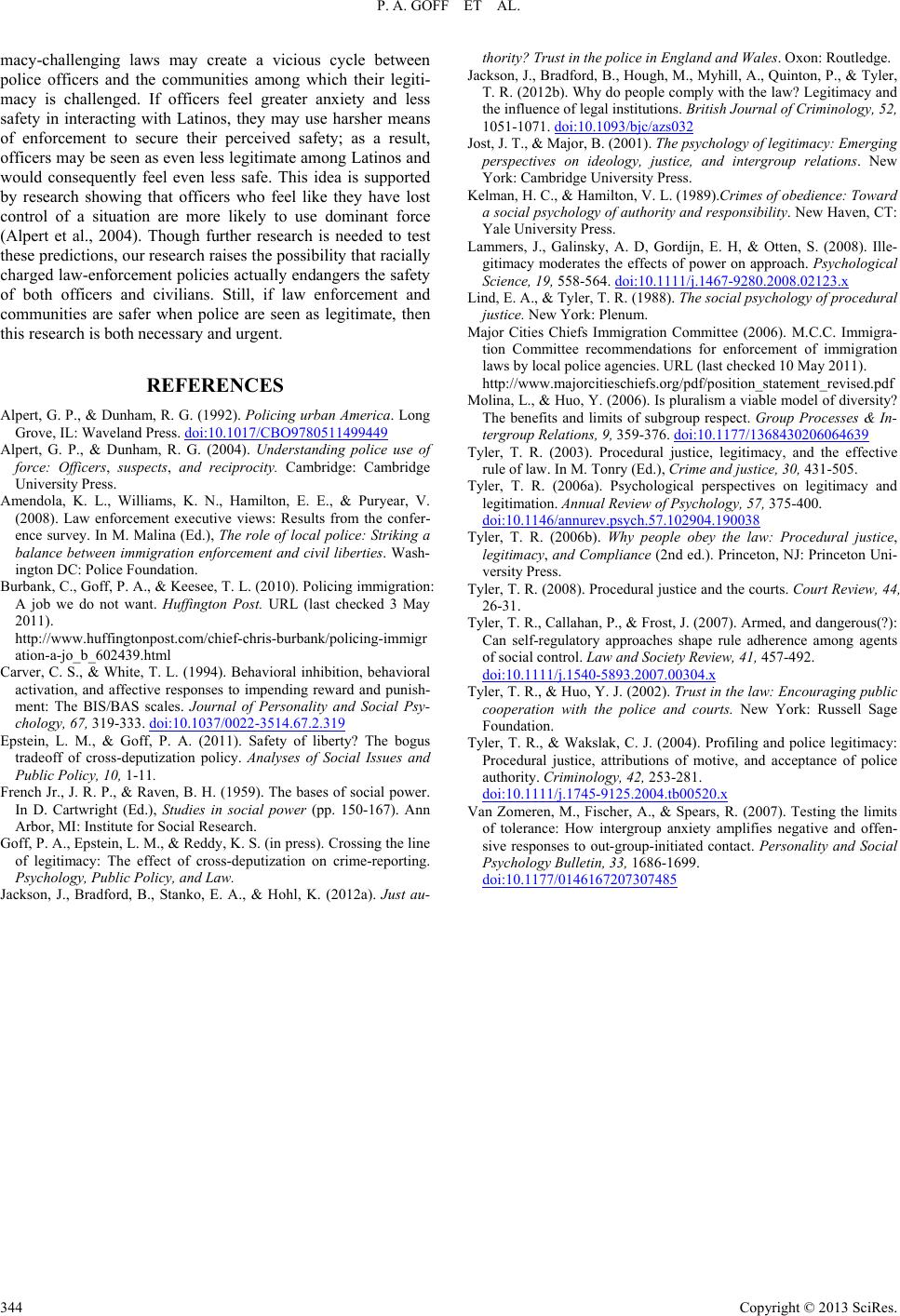
P. A. GOFF ET AL.
macy-challenging laws may create a vicious cycle between
police officers and the communities among which their legiti-
macy is challenged. If officers feel greater anxiety and less
safety in interacting with Latinos, they may use harsher means
of enforcement to secure their perceived safety; as a result,
officers may be seen as even less legitimate among Latinos and
would consequently feel even less safe. This idea is supported
by research showing that officers who feel like they have lost
control of a situation are more likely to use dominant force
(Alpert et al., 2004). Though further research is needed to test
these predictions, our research raises the possibility that racially
charged law-enforcement policies actually endangers the safety
of both officers and civilians. Still, if law enforcement and
communities are safer when police are seen as legitimate, then
this research is both necessary and urgent.
REFERENCES
Alpert, G. P., & Dunham, R. G. (1992). Policing urban America. Long
Grove, IL: Waveland Press. doi:10.1017/CBO9780511499449
Alpert, G. P., & Dunham, R. G. (2004). Understanding police use of
force: Officers, suspects, and reciprocity. Cambridge: Cambridge
University Press.
Amendola, K. L., Williams, K. N., Hamilton, E. E., & Puryear, V.
(2008). Law enforcement executive views: Results from the confer-
ence survey. In M. Malina (Ed.), The role of local police: Striking a
balance between immigration enforcement and civil liberties. Wash-
ington DC: Police Foundation.
Burbank, C., Goff, P. A., & Keesee, T. L. (2010). Policing immigration:
A job we do not want. Huffington Post. URL (last checked 3 May
2011).
http://www.huffingtonpost.com/chief-chris-burbank/policing-immigr
ation-a-jo_b_602439.html
Carver, C. S., & White, T. L. (1994). Behavioral inhibition, behavioral
activation, and affective responses to impending reward and punish-
ment: The BIS/BAS scales. Journal of Personality and Social Psy-
chology, 67, 319-333. doi:10.1037/0022-3514.67.2.319
Epstein, L. M., & Goff, P. A. (2011). Safety of liberty? The bogus
tradeoff of cross-deputization policy. Analyses of Social Issues and
Public Policy, 10, 1-11.
French Jr., J. R. P., & Raven, B. H. (1959). The bases of social power.
In D. Cartwright (Ed.), Studies in social power (pp. 150-167). Ann
Arbor, MI: Institute for Social Research.
Goff, P. A., Epstein, L. M., & Reddy, K. S. (in press). Crossing the line
of legitimacy: The effect of cross-deputization on crime-reporting.
Psychology, Public Policy, and Law.
Jackson, J., Bradford, B., Stanko, E. A., & Hohl, K. (2012a). Just au-
thority? Trust in the police in England and Wales. Oxon: Routledge.
Jackson, J., Bradford, B., Hough, M., Myhill, A., Quinton, P., & Tyler,
T. R. (2012b). Why do people comply with the law? Legitimacy and
the influence of legal institutions. British Journal of Criminology, 52,
1051-1071. doi:10.1093/bjc/azs032
Jost, J. T., & Major, B. (2001). The psychology of legitimacy: Emerging
perspectives on ideology, justice, and intergroup relations. New
York: Cambridge University Press.
Kelman, H. C., & Hamilton, V. L. (1989).Crimes of obedience: Toward
a social psychology of authority and responsibility. New Haven, CT:
Yale University Press.
Lammers, J., Galinsky, A. D, Gordijn, E. H, & Otten, S. (2008). Ille-
gitimacy moderates the effects of power on approach. Psychological
Science, 19, 558-564. doi:10.1111/j.1467-9280.2008.02123.x
Lind, E. A., & Tyler, T. R. (1988). The social psychology of procedural
justice. New York: Plenum.
Major Cities Chiefs Immigration Committee (2006). M.C.C. Immigra-
tion Committee recommendations for enforcement of immigration
laws by local police agencies. URL (last checked 10 May 2011).
http://www.majorcitieschiefs.org/pdf/position_statement_revised.pdf
Molina, L., & Huo, Y. (2006). Is pluralism a viable model of diversity?
The benefits and limits of subgroup respect. Group Processes & In-
tergroup Relations, 9, 359-376. doi:10.1177/1368430206064639
Tyler, T. R. (2003). Procedural justice, legitimacy, and the effective
rule of law. In M. Tonry (Ed.), Crime and justice, 30, 431-505.
Tyler, T. R. (2006a). Psychological perspectives on legitimacy and
legitimation. Annual Review of Psychology, 57, 375-400.
doi:10.1146/annurev.psych.57.102904.190038
Tyler, T. R. (2006b). Why people obey the law: Procedural justice,
legitimacy, and Compliance (2nd ed.). Princeton, NJ: Princeton Uni-
versity Press.
Tyler, T. R. (2008). Procedural justice and the courts. Court Review, 44,
26-31.
Tyler, T. R., Callahan, P., & Frost, J. (2007). Armed, and dangerous(?):
Can self-regulatory approaches shape rule adherence among agents
of social control. Law and Society Review, 41, 457-492.
doi:10.1111/j.1540-5893.2007.00304.x
Tyler, T. R., & Huo, Y. J. (2002). Trust in the law: Encouraging public
cooperation with the police and courts. New York: Russell Sage
Foundation.
Tyler, T. R., & Wakslak, C. J. (2004). Profiling and police legitimacy:
Procedural justice, attributions of motive, and acceptance of police
authority. Criminology, 42, 253-281.
doi:10.1111/j.1745-9125.2004.tb00520.x
Van Zomeren, M., Fischer, A., & Spears, R. (2007). Testing the limits
of tolerance: How intergroup anxiety amplifies negative and offen-
sive responses to out-group-initiated contact. Personality and Social
Psychology Bulletin, 33, 1686-1699.
doi:10.1177/0146167207307485
Copyright © 2013 SciRes.
344